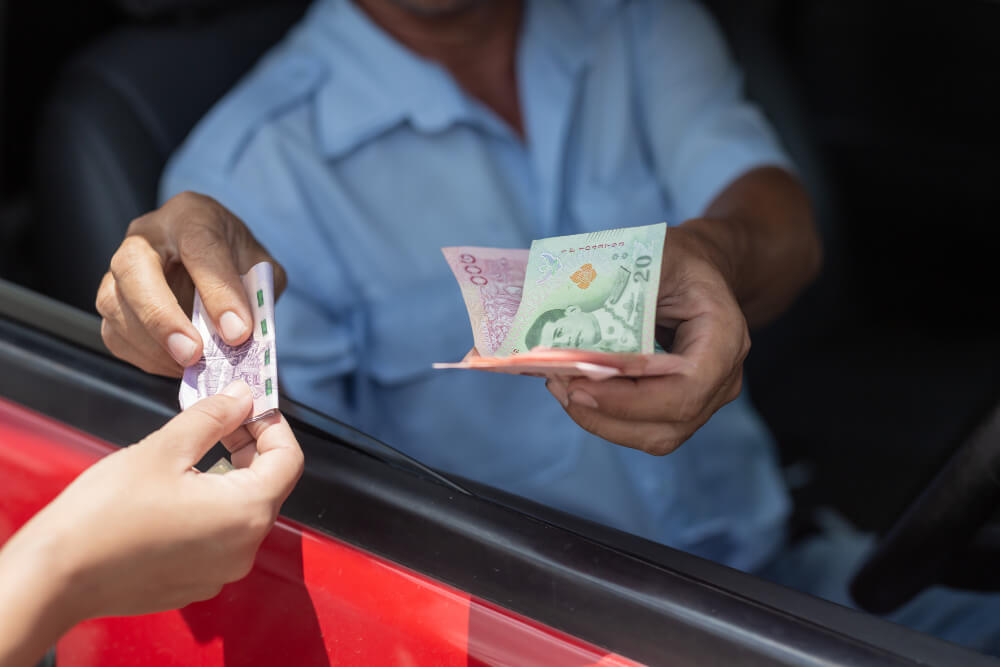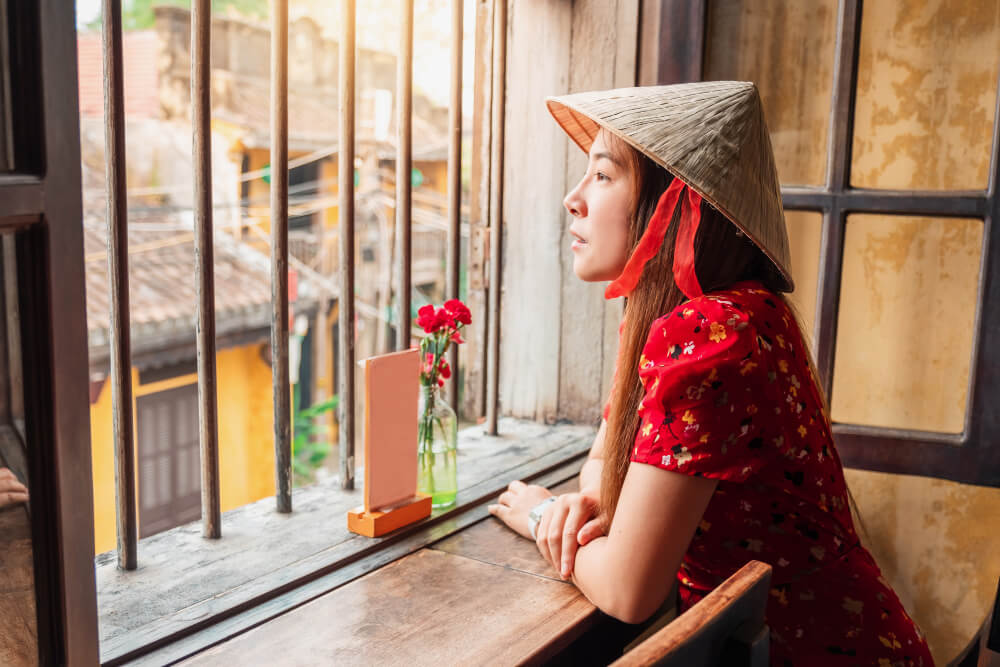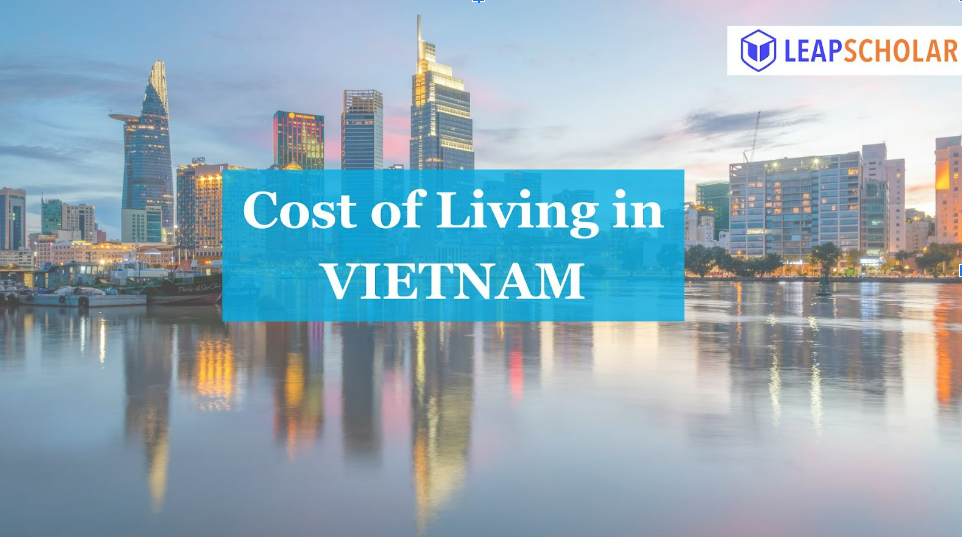Are you considering a move to Vietnam? You’re not alone. With its rich culture, stunning landscapes, and affordable living, Vietnam has become a top destination for international students, digital nomads, and foreigners.
Recent data shows that the cost of living in Vietnam is significantly lower than in many Western countries. For example, a one-bedroom apartment in the city centre costs around ₹30,000 to ₹60,000 per month, and a meal at a local restaurant can be as cheap as ₹75 to ₹300!
Key Highlights
Here is a table highlighting the key details you need to know before planning your move to Vietnam. Learn about the cost of living in Vietnam to prepare your expense chart accordingly.
| Category | Average Monthly Cost (INR / VND) | Key Highlights |
|---|---|---|
| Accommodation | ₹8,000 – ₹14,000 (2,400,000 – 4,200,000 VND) | Shared apartments and dorms are affordable, especially in smaller cities. |
| Food & Groceries | ₹4,000 – ₹7,000 (1,200,000 – 2,100,000 VND) | Street food is very cheap; home cooking lowers costs. |
| Transportation | ₹1,000 – ₹5,000 (306,338 – 1,531,694 VND) | Monthly bus passes and bike rentals are budget-friendly. |
| Utilities & Internet | ₹1,500 – ₹3,000 (450,000 – 900,000 VND) | Electricity, water, and internet are low-cost and widely available. |
| Healthcare | ₹300 – ₹600 (90,000 – 180,000 VND) | Basic medical services are inexpensive and accessible. |
| Entertainment & Lifestyle | ₹2,000 – ₹4,000 (600,000 – 1,200,000 VND) | Gyms, movies, shopping are affordable with student discounts. |
| Total Monthly Budget | ₹20,000 – ₹35,000 (6,000,000 – 10,500,000 VND) | Easily manageable for Indian students with moderate spending habits. |
| Cheapest Cities | Hanoi, Da Nang | Da Nang offers beach lifestyle + affordability; Hanoi balances culture + cost. |
| Currency Exchange | 1 INR ≈ 300 VND | Da Nang offers a beach lifestyle + affordability; Hanoi balances culture + cost. |
| Savings Tips | Maximise savings through budgeting and lifestyle choices. | Gyms, movies, and shopping are affordable with student discounts. |
Choose your dream country
When do you want to study abroad?
What's your highest level of education?
Select you current city
How Leap will help you
Personalised University Shortlist
Express Applications with Quicker Admits
End-to-End Application Support
Thinking about finalising your move to Vietnam? Don’t wait. Give our detailed guide a read and start planning your study journey!
Accommodation Costs in Vietnam
Accommodation is the biggest component of monthly expenses. Students can choose from university dormitories, PGs (paying guest) and shared flats, or independent studio apartments.
| Aspect | Vietnam Living Cost in INR/month |
|---|---|
| University Dorms | ₹4,000 to ₹7,000 (1,225,355 VND to 2,144,372 VND) |
| Shared Flats | ₹8,000 to ₹12,000 (2,450,712 VND to 3,676,067 VND) |
| Independent Studio Apartments | ₹12,000 to ₹20,000 (2,450,712 VND to 6,126,779 VND) |

Vietnam offers a wide variety of rental housing options tailored to different budgets and preferences. You can choose from apartments in high-rise buildings in bustling cities like Hanoi and Ho Chi Minh City, which provide modern amenities and stunning views.
Alternatively, you might opt for a modest room in a shared house, perfect for those looking to save money while experiencing a communal living environment. Whether you prefer a fully furnished apartment or a simple, cosy studio, Vietnam has accommodations to meet your financial and comfort needs.
Room Rent in Vietnam in Indian Rupees
Rental costs in Vietnam vary based on the location, size, and type of property. Here's a general overview of what you can expect.
| Property Type | Average Monthly Rent (VND) | Approximate Monthly Rent (INR) | Notes |
|---|---|---|---|
| One-Bedroom Apartment (Outside City Centre) | 7,800,000 VND | ₹26,000 | Affordable option for students; prices may vary by city. |
| One-Bedroom Apartment (City Centre) | 12,650,000 VND | ₹42,167 | Higher due to central location and amenities. |
| Three-Bedroom Apartment (City Centre) | 28,500,000 VND | ₹95,000 | Suitable for families or shared accommodation. |
| Studio Apartment (Outside City Centre) | 6,300,000 VND | ₹21,000 | Compact and budget-friendly; ideal for solo living. |
| Three-Bedroom Apartment (Outside City Centre) | 16,350,000 VND | ₹54,500 | More spacious, yet economical compared to city centre. |
Room rent in Major Cities in Indian rupees
- A room in Hanoi or Ho Chi Minh City: ₹9,000 to ₹14,000/month
- Smaller cities like Da Nang: ₹7,000 to ₹11,000/month
Food and Grocery Prices
Cooking at home is generally more cost-effective than dining out in Vietnam. A basic grocery bill for one person can range from ₹4,000 to ₹7,000 per month, depending on dietary preferences and the frequency of home-cooked meals.
Average Expense of Street Food, Local, and Western Restaurants
Dining out offers many options, from inexpensive street food to high-end restaurants.
| Dining Option | Cost per Meal (INR) |
| Street Food | ₹100 - ₹300 |
| Mid-range restaurant | ₹300 - ₹600 |
| Western Restaurants | ₹750 - ₹1,500 |
Average Monthly Food Costs
Budgeting for food in Vietnam is quite manageable. The costs are generally low, whether you prefer cooking at home or dining out. Here is a table outlining the average costs of food you can expect when living in Vietnam.
| Food Expense | Monthly Cost (INR) |
| Groceries (Cooking at Home) | ₹4,000 - ₹6,000 |
| Dining Out (Mixed) | ₹7,000 |
Transportation Expenses

Transportation in Vietnam is affordable and varied. Public transport options include buses and taxis, while private transport options include motorbike rentals and ride-hailing services.
Average Monthly Transportation Costs
Transportation in Vietnam is both affordable and varied. Whether you opt for public buses, taxis, or renting a motorbike, the costs are relatively low. Monthly expenses for transportation typically range from ₹1,000 to ₹5,000, making it easy to get around without straining your budget.
| Transport Mode | Cost (INR) |
| Monthly Bus Pass | ₹500 - ₹1,000 |
| Short Taxi Rides | ₹200 - ₹500 |
| Bike rental (monthly) | ₹2,000 - ₹4,000 |
| Petrol cost | ₹60/litre |
Renting a Motorbike
Renting a motorbike can be a convenient and cost-effective option for long-term residents. Monthly rental costs in Vietnam range from ₹2,000 - ₹4,000.
This includes basic maintenance and, in some cases, insurance. Renting a motorbike eliminates the need for a large initial investment and offers flexibility, especially if you plan to stay in Vietnam for a shorter period. Additionally, it provides the convenience of avoiding the hassles of repairs and upkeep, making it a hassle-free choice for daily transportation.
Use Apps for Public Transport
Technology apps like Grab and GoViet are popular in Vietnam for navigating public transport schedules, booking rides, and getting around efficiently. These apps offer convenience and affordability, making transportation easy to manage.
Utility and Service Costs
Monthly utility costs in Vietnam include electricity, water, and gas. Electricity costs are calculated per kilowatt-hour (kWh) and typically average around ₹7 per kWh. On average, basic utilities for a standard apartment amount to ₹3,750 to ₹7,500 per month.
| Utility | Average Monthly Cost (VND) | Approximate Monthly Cost (INR) | Notes |
|---|---|---|---|
| Electricity | 1,500,000 – 2,500,000 VND | ₹5,000 – ₹8,333 | Typically inexpensive; it depends on consumption. |
| Water | 100,000 – 200,000 VND | ₹333 – ₹667 | Typically inexpensive; depends on consumption. |
| Gas | 180,000 – 300,000 VND | ₹600 – ₹1,000 | Used mainly for cooking; varies by usage. |
| Internet | 200,000 – 400,000 VND | ₹667 – ₹1,333 | High-speed connections; often included in rent. |
Internet and Mobile Phone Services
Internet services in Vietnam are affordable and widely available, with high-speed connections averaging ₹750 to ₹1,500 per month. Mobile phone services are also inexpensive, with various prepaid and postpaid plans ranging from ₹300 to ₹750 per month, depending on usage and data requirements.
| Service | Package Type | Average Monthly Cost (INR) | Average Monthly Cost (VND) |
|---|---|---|---|
| Internet | Basic | ₹550 | 165,000 VND |
| Standard | ₹750 | 225,000 VND | |
| Premium | ₹1,500 | 450,000 VND | |
| Mobile Phone | Prepaid Basic | ₹150 | 45,000 VND |
| Prepaid Comprehensive | ₹300 – ₹750 | 90,000 – 225,000 VND | |
| Postpaid Basic | ₹300 | 90,000 VND | |
| Postpaid Advanced | ₹750 | 225,000 VND |
Notes:
- Internet plans typically include unlimited data with varying speeds.
- Mobile phone costs depend on data limits, call time, and SMS packages.
- Some landlords or student housing may include Wi-Fi as part of the rent.
Additional Fees
Additional fees for services like parking and wifi networks in apartment complexes may apply. Parking fees typically range from ₹750 to ₹1,500 per month. Some apartment complexes may charge extra for internet services to your expenses.
| Service | Average Monthly Cost (₹) |
| Parking Fees | ₹750 to ₹1,500 |
| Extra Internet Services | ₹750 to ₹1,500 |
Healthcare and Wellness Costs
Since healthcare is super affordable, it won't substantially increase the cost of living in Vietnam, with good quality services available in major cities. International students are advised to have health insurance, which can cost between ₹7,500 to ₹15,000 per month, depending on the coverage.
Average Monthly Healthcare and Wellness Costs
Fitness enthusiasts will find that gym memberships and other fitness-related expenses are reasonably priced in Vietnam.
| Category | Cost (INR) | Cost (VND) |
|---|---|---|
| Health Insurance | ₹7,500 – ₹15,000 | 2,250,000 – 4,500,000 VND |
| Gym Membership | ₹1,500 – ₹3,000 | 450,000 – 900,000 VND |
| Yoga Classes | ₹750 – ₹1,500 | 225,000 – 450,000 VND |
| Fitness Classes | ₹1,500 – ₹3,000 | 450,000 – 900,000 VND |
Key Notes:
- Health insurance prices vary by provider, age, and coverage scope (public vs private).
- Many gyms and wellness centres offer student discounts.
- Yoga and fitness class costs depend on session frequency and location (studio vs group outdoor sessions).
Entertainment and Leisure Costs
The cost of living in Vietnam includes various entertainment and leisure activities that cater to various interests and preferences. From exploring the bustling night markets of Hanoi and Ho Chi Minh City to relaxing on the beautiful beaches of Da Nang and Nha Trang, Vietnam offers diverse experiences at affordable prices.
Enjoy modern amenities such as cinemas and shopping malls, or immerse yourself in cultural festivals and historical sites. Whether you're interested in savouring street food, experiencing traditional water puppet shows, or exploring ancient temples, Vietnam provides a rich tapestry of activities that won't break the bank.
Shopping Malls in Vietnam:
- Vincom Centre (Ho Chi Minh City): Located in District 1, this shopping mall offers a wide range of international and local brands, dining options, and entertainment facilities.
- Aeon Mall (Hanoi and Ho Chi Minh City): A popular destination for shopping, dining, and entertainment, located in both major cities.
- Lotte Centre (Hanoi): A luxurious shopping mall featuring high-end brands, gourmet restaurants, and an observation deck with panoramic city views.
Here’s an overview of the costs.
| Activity | Average Cost (INR) | Average Cost (VND) | Notes |
|---|---|---|---|
| Nightlife (per night) | ₹1,500 – ₹5,000 | 450,000 – 1,500,000 VND | Costs vary based on venue type; local bars are more affordable, while upscale clubs and rooftop bars are pricier. |
| Cinema Tickets (per ticket) | ₹150 – ₹300 | 45,000 – 90,000 VND | Prices depend on theater chain, location, and seat type. |
| Local Cultural Events (per event) | ₹150 – ₹500 | 45,000 – 150,000 VND | Ticket prices vary by event type and scale; some festivals offer free entry. |
| Casual Dining (per meal) | ₹200 – ₹600 | 60,000 – 180,000 VND | Street food and local eateries offer meals at lower prices; restaurants may be on the higher end. |
| High-End Dining (per meal) | ₹2,400 – ₹8,100 | 720,000 – 2,430,000 VND | Fine dining establishments, especially in major cities, can be significantly more expensive. |
| Gym Membership (per month) | ₹800 – ₹2,000 | 240,000 – 600,000 VND | Monthly fees vary based on gym facilities and location. |
| Sports Clubs/Fitness Classes | ₹1,000 – ₹2,500 | 300,000 – 750,000 VND | Prices depend on the type of class (e.g., yoga, martial arts) and frequency. |
| Outdoor Activities (per outing) | ₹500 – ₹2,000 | 150,000 – 600,000 VND | Activities like kayaking, hiking, and guided tours vary in cost based on location and duration. |
Living expenses in Vietnam can vary significantly between major cities. In bustling hubs like Hanoi and Ho Chi Minh City, costs for accommodation, dining, and transportation are higher compared to smaller cities and coastal areas.
Also check: Calculator for Tuition fees and living cost
Differences in Living Expenses Between Major Cities
The cost of living in Vietnam varies widely between major cities like Hanoi and Ho Chi Minh City compared to coastal and smaller cities.
- Hanoi and Ho Chi Minh City: These cities are the most expensive due to their status as economic and cultural hubs. Accommodation, dining, and transportation costs are higher compared to other regions. For example, renting a one-bedroom apartment in the city centre can cost between ₹30,000 and ₹60,000 per month.
- Coastal and Smaller Cities: Da Nang, Nha Trang, and smaller towns offer more affordable living. The accommodation cost is significantly lower, with similar apartments costing between ₹15,000 and ₹30,000 per month. Food and transportation costs are also lower.
| Category | Hanoi and Ho Chi Minh City | Coastal and Smaller Cities |
| Accommodation | ₹30,000 to ₹60,000 per month for a one-bedroom apartment in the city centre | ₹15,000 to ₹30,000 per month for a similar apartment |
| Transportation | Higher costs with more extensive public transport options and higher taxi fares | Lower costs with cheaper public transport and taxi fares |
Location significantly impacts the cost of accommodation, food, and transportation in Vietnam. In major cities like Hanoi and Ho Chi Minh City, accommodation costs are higher.
Tips on How to Reduce the Cost of Living in Vietnam

To make the most out of your budget and manage the cost of living in Vietnam efficiently, here are some strategies to minimise expenses:
- Embrace Local Markets: Shopping at local markets for groceries and daily necessities is much cheaper than shopping at supermarkets or malls. Fresh produce and local products are often more affordable and of higher quality.
- Use Public Transportation: Public transportation is a cost-effective way to get around. Buses and local trains are very affordable and can help you save a significant amount on travel expenses.
Advice on Wise Renting and Exploring Free or Low-Cost Activities
- Wise Renting: When looking for accommodation, consider renting slightly outside the city centre where rents are lower. Sharing an apartment can also help reduce costs.
- Explore Free or Low-Cost Activities: Vietnam offers many free or low-cost activities. Exploring local parks, beaches, and cultural sites can be both enjoyable and budget-friendly. Many cities also host free community events and festivals.
Conclusion
Understanding the cost of living in Vietnam is essential for anyone considering studying in this vibrant country. The average monthly living expenses range from ₹37,500 to ₹75,000, with higher costs in major cities like Hanoi and Ho Chi Minh City. Education costs vary, with public universities being affordable and international universities being slightly expensive.
Entertainment, dining, and transportation are generally budget-friendly, making Vietnam an attractive destination for foreigners and students. By embracing local markets and public transportation, you can explore free or low-cost activities and enjoy a comfortable and enriching life in Vietnam!
Frequently Asked Questions
Q. What are the average living expenses in Vietnam?
Ans. The average living expenses in Vietnam range from ₹37,500 to ₹75,000 per month. This estimate includes rent, utilities, food, transportation, and entertainment. Living in major cities like Hanoi and Ho Chi Minh City can be more expensive than in smaller towns or rural areas. Public transportation and local markets can help keep costs down. Overall, Vietnam remains an affordable destination for many.
Q. What is the average monthly living cost in Vietnam for International citizens?
Ans. The typical expatriate's monthly living costs in Vietnam range from ₹45,000 to ₹90,000. This includes renting a comfortable apartment, dining out occasionally, and using local transportation. International schools and private healthcare can add to the expenses. Living in central areas of major cities will also increase costs. Many international citizens find Vietnam to be a more cost-effective place to live than their home countries. Budgeting wisely can allow for a comfortable lifestyle.
Q. How do daily expenses in Vietnam compare to other Southeast Asian countries?
Ans. Daily expenses in Vietnam are generally lower compared to other Southeast Asian countries like Thailand or Malaysia. Basic necessities such as food, transportation, and utilities are affordable. Street food is particularly inexpensive, with meals costing between ₹75 to ₹300. Public transportation, like buses and motorbike taxis, is also budget-friendly. However, imported goods and luxury items can be more expensive. Overall, Vietnam offers a lower cost of living while maintaining a good quality of life.
Q. What is the cost of living in Hanoi for an expat?
Ans. The cost of living in Hanoi for an expat can range from ₹45,000 to ₹90,000 per month. This includes rent for a one-bedroom apartment, which can cost ₹30,000 to ₹60,000 in the city centre. Utilities, internet, and mobile phone services add another ₹5,000 to ₹10,000. Daily expenses such as groceries, dining out, and local transportation are relatively low. International schools and private healthcare will increase monthly costs. Hanoi offers a balance of modern amenities and traditional charm, making it a popular choice for expatriates.
Q. How much is the cost of living in Ho Chi Minh City?
Ans. Living in Ho Chi Minh City, also known as Saigon, typically costs between ₹45,000 to ₹90,000 per month. Renting a one-bedroom apartment in the city centre costs around ₹30,000 to ₹60,000 per month. Monthly utility bills, including electricity, water, and internet, average ₹5,000 to ₹10,000. Food expenses vary, with street food being very affordable and upscale restaurants costing more. Transportation is inexpensive, with motorbike rentals and public buses being popular options. Overall, the city offers a dynamic lifestyle with a relatively low cost of living.
Q. What is the cost of living in Saigon for a student?
Ans. For a student, living expenses in Saigon can range from ₹30,000 to ₹60,000 per month. Shared accommodation or dormitories can reduce housing costs to ₹15,000 to ₹30,000. Utilities and internet typically add ₹3,000 to ₹5,000 monthly. Food expenses are manageable, with street food and campus cafeterias offering budget-friendly options. Transportation costs are low, with many students using bicycles or public buses. Overall, Saigon is an affordable city for students, offering a vibrant culture and numerous amenities.
Q. What is the average cost of living in Vietnam compared to India?
Ans. The average cost of living in Vietnam is generally higher than in India but still quite affordable. In Vietnam, monthly expenses range from ₹37,500 to ₹75,000, while in India, they can be as low as ₹25,000 to ₹50,000 for similar living standards. Rent, food, and transportation are slightly more expensive in Vietnam. However, Vietnam offers a higher quality of life in terms of infrastructure and public services. Both countries are budget-friendly compared to Western nations. Individual preferences and lifestyle choices will significantly impact overall costs in both countries.
Q. What are the typical monthly expenses in Vietnam for a family?
Ans. For a family, typical monthly expenses in Vietnam can range from ₹75,000 to ₹1,50,000. This includes renting a larger apartment or house, which costs between ₹45,000 to ₹90,000. Utility bills, including electricity, water, and internet, add ₹7,500 to ₹15,000. Food expenses for a family can range from ₹15,000 to ₹30,000, depending on dining habits. Education costs for children, especially in international schools, can be significant, adding ₹75,000 to ₹1,50,000 per term. Transportation and other miscellaneous expenses also contribute to the total monthly cost.
Q. How do living expenses in Vietnam differ between major cities and smaller towns?
Ans. Living expenses in Vietnam's major cities, like Hanoi and Ho Chi Minh City, are higher compared to smaller towns and coastal cities. Rent in major cities ranges from ₹30,000 to ₹60,000 for a one-bedroom apartment, whereas in smaller towns, it can be as low as ₹15,000 to ₹30,000. Food and transportation costs are also higher in larger cities due to greater demand and higher living standards. Smaller towns offer a more relaxed lifestyle at a lower cost, with affordable housing and local markets. Overall, choosing a location significantly impacts living expenses.
Q. What is the cost of living in Vietnam vs India for digital nomads?
Ans. For digital nomads, the cost of living in Vietnam is slightly higher than in India but it offers better infrastructure and connectivity. In Vietnam, monthly expenses range from ₹45,000 to ₹75,000, including co-working spaces and high-speed internet. India offers lower costs, ranging from ₹30,000 to ₹60,000, with affordable accommodation and food. Vietnam's cities provide modern amenities and a vibrant expatriate community, while India offers diverse cultural experiences at a lower cost. Both countries are attractive for digital nomads due to their affordability and unique cultures.
Q. How much do daily expenses in Vietnam typically cost?
Ans. Daily expenses in Vietnam are very manageable. Meals at local eateries cost between ₹75 to ₹300, while dining at mid-range restaurants costs around ₹300 to ₹750. Public transportation, such as buses and motorbike taxis, is affordable, with fares ranging from ₹15 to ₹150. Daily essentials like groceries and household items are also inexpensive when purchased from local markets. Entertainment options, such as cinema tickets, cost ₹300 to ₹600. Overall, daily expenses in Vietnam are low, making it easy to live comfortably on a budget.
Q. How much does healthcare cost in Vietnam for expatriates?
Ans. Healthcare costs for expatriates in Vietnam are relatively affordable compared to Western countries. Monthly health insurance premiums range from ₹7,500 to ₹15,000, depending on the coverage. A visit to a private clinic can cost between ₹750 to ₹3,000. Prescription medications and treatments are generally inexpensive. Major cities like Hanoi and Ho Chi Minh City have modern hospitals with English-speaking staff. It's advisable for expatriates to have health insurance to cover any major medical expenses. Overall, Vietnam offers good healthcare services at reasonable prices.
















Have Questions? Get Guidance to reach your Dream University
Connect with India's finest counsellors and biggest study abroad community.
Get Guidance